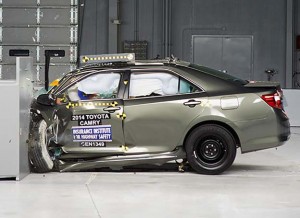
Toyota modified its Camry in November, and it now gets an "Acceptable" rating in the IIHS small overlap crash test.
Toyota is in the midst of some serious damage control – quite literally.
The maker took a beating earlier this year when several models were slammed for their poor performance in the new “small overlap” crash test established by the Insurance Institute for Highway Safety. That meant the best-selling passenger car in America might lose its IIHS “Top Safety Pick” endorsement while influential Consumer Reports, notably, yanked its “Recommended” rating for the midsize sedan.
Toyota officials have been frantically trying to downplay the significance of the poor showing by a variety of models that also included Corolla and Prius – while also noting that they’re far from the only ones who’ve been hurt by doing poorly in the new IIHS test.
Indeed, that was a key reason why the number of models that the Insurance Institute this week awarded “Top Safety Pick” and “Top Safety Pick Plus” awards plunged to 39 from 130 last year.
Significantly, Camry was named a top pick and Prius got the vaunted plus rating. Meanwhile, Consumer Reports has put Camry back on its recommended list. But there’s a footnote here. The IIHS pointedly noted that only Camry and Prius models produced since November qualified.
What happened? First, it helps to understand what the small overlap crash test is, and why it’s become so important. The test is meant to replicate a common type of real-world crash, 25% of a vehicle’s front end on the driver’s side striking a rigid barrier at 40 mph. This is basically what happens when the front corners of two vehicles collide, or when a car clips a tree or utility pole.
(Click Here to see the 39 “safest cars in America.”)
While most manufacturers have done an admirable job of developing crash structures that can deal with more traditional tests – like a dead-on strike into a barrier or a slight off-center impact – the small overlap test is like a knee to the groin, striking where most vehicles are most vulnerable. Until recently, only a handful of models were designed specifically to absorb such an impact – in part because it can be so difficult to engineer around. But it also require more steel and the added mass has a negative impact on fuel economy.
But with IIHS – and now Consumer Reports – making such a point of holding makers accountable, the industry is racing to respond. That’s particularly true for Toyota. So, while brand boss Bill Fay last week tried to downplay the setback, noting that Camry was “still a 5-star car” according to the National Highway Traffic Safety Administration, the maker already had a fix in production.
And while it didn’t match the crash test results of some of its competitors, the post-November Camry scored well enough to get back into IIHS’s good graces. In turn, Consumer Reports gave back the Recommended endorsement.
(Louisiana claims the dubious honor of having America’s worst drivers. Click Here to see how your state fared.”
“New models developed with this test in mind have had a decided advantage over older models, such as the Camry, that were engineered before the small-overlap test was introduced,” the magazine states. Noting modifications have been made to the underlying structure of the Camry, boosting its test results from “Poor” to “Acceptable,” the publication went on to say, “This improvement is enough…to reinstate our recommendation.”
A similar redesign for Prius has put the hybrid back in the good graces of both IIHS and Consumer Reports. But the two organizations have yet to put several other models back into their good graces, CR pointing to the Toyota Prius V and RAV4, and the Audi A4 as vehicles that lost endorsements by failing the small overlap test.
Expect to see the entire line-up re-tuned, so to speak, to pass the new test in the near future, several Toyota officials promised during a visit to Detroit earlier this month.
Toyota is by no means alone. A number of other new models, including the 2014 Chevrolet Corvette, were not designed with the new test in mind and will have to be modified accordingly or risk alienating safety-minded buyers.
(Feds want ignition interlocks mandated after drunk driving conviction. Click Here for the story.)

With so many variables in an auto crash it’s still unknown if this new side impact test has any validity in determining crash worthiness. I certainly wouldn’t buy a vehicle exclusively on crash test data results from lab testing.